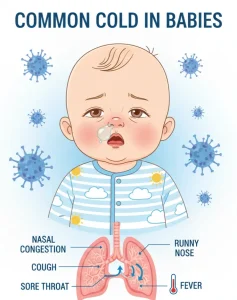Overview
Diagnosis
A healthcare professional can usually diagnose a common cold in a baby based on symptoms. If a bacterial infection or another condition is suspected, tests such as a chest X-ray may be used to rule out other possible causes.
Treatment
Most common colds in babies improve without treatment within seven to ten days. However, a cough may continue for a week or more. Antibiotics are not effective against cold viruses.
Medicines to Reduce Fever and Pain
Never give medicine to a baby without consulting a healthcare professional.
If your baby is uncomfortable due to fever, a fever reducer may help. However, mild fever is a natural response to infection and can support the immune system.
Options for fever and pain relief include:
-
Infants’ or children’s acetaminophen
-
Infants’ or children’s ibuprofen
For babies younger than three months, do not give acetaminophen unless advised by a healthcare professional.
For babies younger than six months, avoid giving ibuprofen or using it in children who are vomiting or dehydrated.
Always follow dosing instructions carefully and use these medicines for the shortest possible duration. If unsure, consult your healthcare professional for the correct dosage.
Children and teenagers recovering from chickenpox or flu-like symptoms should not take aspirin because it is linked to Reye’s syndrome, a rare but serious condition.
Cough and Cold Medicines
Cough and cold medicines are not safe for infants or young children. These medicines do not treat the underlying cause of a cold and can lead to serious or even life-threatening side effects.
Avoid giving any over-the-counter cough or cold medicines to children younger than six years, except for approved fever reducers or pain relievers as directed by a healthcare professional.
Advertisement

